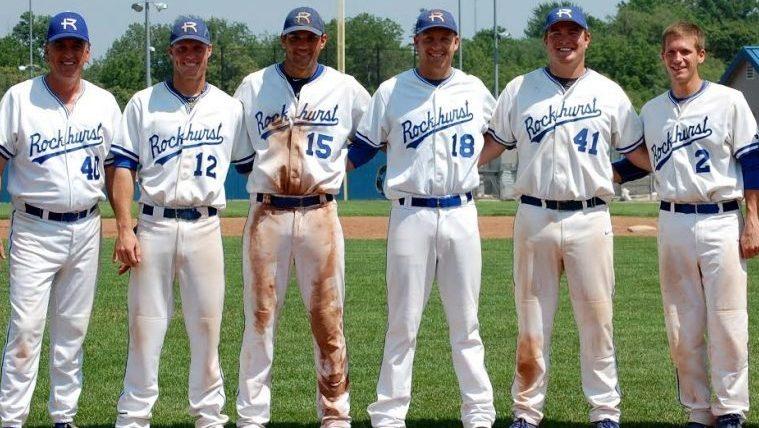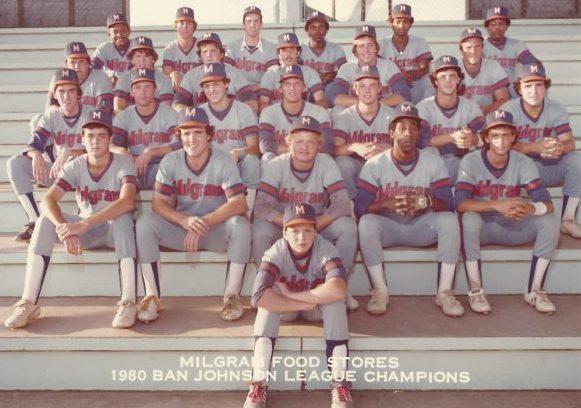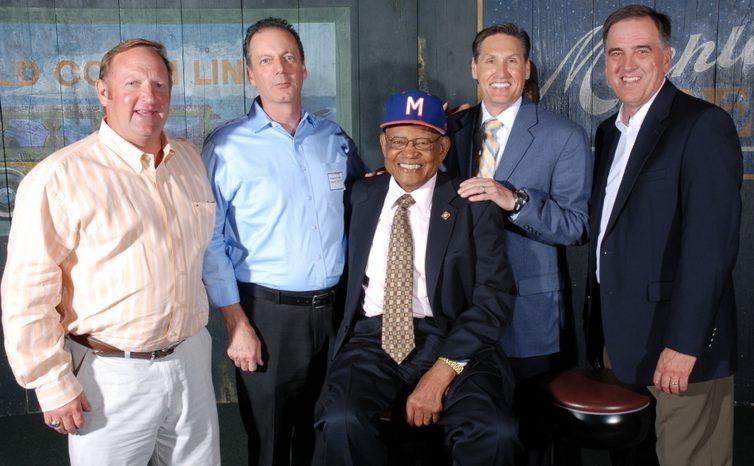


Life and baseball are filled with a litany of cliché idioms meant to slow the mind and clear the stress of the moment. But, for me, there’s one particular phrase I sometimes hear in the back of my mind, voiced in a gravelly, uplifting tone: “Hey, it’s all good, baby.”
This is Gary Burns.
The first time I heard him utter these words was on the pitching mound of Loyola Park at Rockhurst University just after he removed the starting pitcher (who blew the lead). I remember standing among the sullen infielders and seeing that crooked, boyish grin form on his face. Then, like it was nothing-but-a-thing, Gary drops the classic turn-of-phrase I still hear today.
Anyone blessed to know or play for Coach Burns is familiar with the relaxed attitude that has led him to success on and off the field. I believe we all aim to achieve some sort of Zen and peace in our complex lives, but most of us constantly fall short. Gary Burns is one of the few people I’ve met who preaches a “trust that it will all work out” mentality, and then walks the walk.
This is not to paint him as a hippy, wallflower wearing a baseball hat. No, Burns has never been the kind to cower. Throughout his life, as with every single game he steps onto the field, his battle-weary eyes are set on one thing: winning.
“One thing I always loved about playing baseball at Rockhurst was Coach Burns’ willingness to play all schools no matter their size,” said former player Vince Armilio. “We did not shy away from playing [anyone].”
This tenacious mentality, coupled with the easy-does-it outlook, has played a huge role in a lifetime of success.
Last winter Gary Burns, the head baseball coach and Director of Athletics at Rockhurst University, was the 40th inductee of the Ban Johnson Baseball Hall of Fame. It was thirty-nine years ago, in 1977, when Burns joined the Milgram pitching staff under the storied manager Don Motley. He pitched four seasons with the team, helping them win the 1980 championship, while compiling 6-1 record and 2.88 ERA that season.
But Ban Johnson is only one dominant stop in Burns’s decorated playing tenure. After graduating from Belton High School in 1977, Burns attended Johnson County Community College. There he put together a 17-5 record with ERAs of 1.16 and 1.92. This success allowed him to continue playing at Vanderbilt University, where he was the ace reliever on the Commodores’ 1980 SEC championship team.
Great athletes often make poor coaches because the game comes naturally to them, making it difficult to understand why kids fail, thus leading to diminished opportunities for success. However, one of Burns’s admirable traits is his penchant for providing players opportunity.
Ban Johnson may have played a role in developing this.
Coach Motley can remember Burns attending a tryout for Milgram in the spring of 1977. Within five minutes of watching him throw, Motley and then coach Paul Provas were determined to help get him a baseball scholarship to JCCC.
And they did.
This turn of events left a lasting impression on Gary and he has continued to pay it forward.
“Coach Burns gave me the chance to play that no one else did,” former player Michael Hiatt said.
“He gave me the opportunity to play as a freshman, which is unusual for a team coming off a College World Series appearance,” Armilio said. “He didn’t care about my age, he cared about my ability.”
There’s a story Gary Burns occasionally tells his seniors following graduation, when life without baseball lingers before them. He was recently graduated from Vanderbilt and was undrafted that summer. The numbers were there. The success was there. Yet many lesser-skilled players were taken over him. He recalls one afternoon after a pro try-out, standing in the kitchen with his father, teary-eyed and cursing with anger at not being picked-up.
That’s when his father says (paraphrased): “There comes a time when you’ve got to accept what it is. Maybe it’s time to move on.”
Burns cringes at the words, like a blow to his core; his person. Overwhelming emotions stir up a deep anger that spews out of him in a fit of cussing and heated gestures, like a baseball manager in the face of a lousy umpire.
I bring up this short anecdote as a means to convey the pure, ingrained passion Burns has for baseball, while foreshadowing the next phase of his life. For, although his playing days were over, he still had something to give to the game.
So, he proceeded to take assistant coach positions at Indiana State, Vanderbilt, and Clemson universities. Finally, in 1994, Burns was hired by Rockhurst College to revamp the baseball program following an 18 year hiatus.
After rebuilding Rockhurst into a successful program in five short years, he set a precedent in moving the team from NAIA to NCAA Div II by becoming a member of the Heartland Conference.
That year was 1999. No one thought it would be a successful year for the Rockhurst Hawks. Burns didn’t care. With the same team that played NAIA a year before, they captured the Central Region title and went to the NCAA Div II College World Series in Montgomery, finishing fourth after losing to eventual national champion California State – Chico. (This RU team included 14 BJ players.)
Rockhurst has never been back to the World Series, but Burn’s 2000, 2003, and 2012 teams advanced to the regional finals.
I was fortunate enough to play on the 2012 team. Another entirely vivid memory I hold details our team hobbling and limping into the regional championship game, injury plagued and set to play the number one team with only JV pitchers in the pen. Halfway through his pre-game speech, Burns stops and holds out his arms. He says, “Look! I’ve got goosebumps! If you don’t think I believe in you guys, you’re wrong. This is where memories are made, boys.”
After coaching for twenty-five-plus years of college baseball, Burns had the same visceral passion for the game as the day in his parents’ kitchen when he hung them up.
That is a man who loves what he does.
Throughout his Rockhurst career, Burns’ teams have compiled a 661-449 record in 22 seasons with 14 post-season appearances, including 8 berths in the NCAA Div II Regional Tournament.
In 2011, Burns was named Rockhurst’s Director of Athletics, which oversees six men’s and eight women’s teams. He has also been the prominent catalyst in the building of Rockhurst’s baseball stadium. I can point out plenty of statistics to show Burns’ success, but there’s one number in particular that he’s most proud of: His players have achieved a graduation rate of 91% since 1994.
“He instills in all of his players how important academics are, and because of that his players are successful after they finish playing,” Armilio said. “He makes sure we are productive people in society, whatever our job is.”
In the end, the value of a person’s life cannot be shown with charts and stat-boards. The human condition implies an invisible force of faith and love and generosity that is felt—right away, or years down the road—and makes them who they really are.
Ray Chang, twelve-year professional veteran, said about Burns: “The thing that makes him so special is the fact that he had a stronger impact on me off the field than on. He taught me the things necessary to become a better man towards your peers, your friends and most importantly your loved ones.”
The greatest accomplishment a man can have is his family. So, despite all of the decorations and awards, the true exemplification of a life well-lived is Burns’ wife, Janet, and two sons, Jim and Jack.
Like most of his former players, Gary Burns has had an impact on me. Again, I can list all of the details and memories on several pages, but, to be honest, most days it’s just his easy going voice in the back of my mind, reminding me that it’s all good, baby.